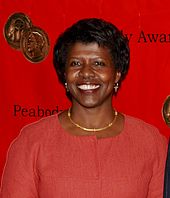Gwen Ifill
[3] Gwen Ifill was posthumously awarded the Dunnigan-Payne Prize for lifetime career achievement on Saturday, April 29, 2023, at the White House Correspondents' Dinner.
[7][8] Her father's ministry required the family to live in several cities in New England and on the Eastern Seaboard during her youth, where he pastored AME churches.
[9] As a child, she lived in Pennsylvania and Massachusetts church parsonages and in federally subsidized housing in Buffalo and New York City.
[10][13] In October 1999, she became the moderator of the PBS program Washington Week in Review, the first black woman to host a national political talk show on television.
[19] Ifill served on the boards of the Harvard Institute of Politics, the Committee to Protect Journalists, the Museum of Television and Radio, and the University of Maryland's Philip Merrill College of Journalism.
On October 5, 2004, Ifill moderated the vice-presidential debate between the Republican Vice President Dick Cheney and the Democratic candidate and U.S.
Senator from Delaware Joe Biden and the Republican governor of Alaska, Sarah Palin, at Washington University in St.
[24] Before the 2008 debate, Ifill's objectivity was questioned by conservative talk radio, blogs, cable news programs and some independent media analysts because of her book The Breakthrough: Politics and Race in the Age of Obama, which was scheduled to be released on Inauguration Day 2009, but whose contents had not been disclosed to the debate commission or the campaigns.
[25] The book was mentioned in The Washington Times and appeared in trade catalogues as early as July 2008, well before Ifill was selected by the debate committee.
"[25] John McCain, the Republican presidential nominee, said in an interview on Fox News Channel, "I think she will do a totally objective job because she is a highly respected professional."
To critics Ifill responded, I've got a pretty long track record covering politics and news, so I'm not particularly worried that one-day blog chatter is going to destroy my reputation.
PBS ombudsman Michael Getler twice wrote about letters he received complaining of bias in Ifill's news coverage.
In order of appearance other experts during the run were Sam Donaldson, George Stephanopoulos, Wolf Blitzer, Cokie Roberts, Candy Crowley, Connie Chung, Jodi Picoult, Ken Jennings, Mo Rocca, and Bill Nye.
She was used as a lifeline just once, by Nik Bonaddio, who was accurately told by Ifill that the quote "The first thing we do, let's kill all the lawyers" was a line from Shakespeare's "Henry VI, Part II".
[36] The book focused on several African-American politicians, including Obama and other up-and-comers such as then-member of Congress Artur Davis, then-Massachusetts governor Deval Patrick, and then mayor of Newark, New Jersey Cory Booker.
The publisher, Random House, described the book as showing "why this is a pivotal moment in American history" through interviews with black power brokers and through Ifill's observations and analysis of issues.
She was close to her large extended family, socialized with Washington luminaries as well as colleagues, and supported and mentored young journalists.
[69] President Obama extended his condolences to Ifill's family, saying that he "always appreciated [her] reporting even when [he] was at the receiving end of one of her tough interviews.
"[70] Speaker of the House Paul Ryan, in expressing his condolences, described Ifill as "an incredibly talented and respected journalist.

